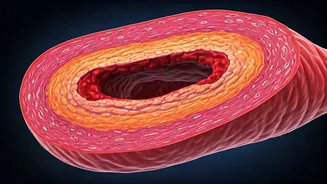Vitamin D Supplements
Vitamin D supplements have become quite common, but it's important to understand what they do. Vitamin D aids in calcium absorption, which is vital for
bone health and other bodily functions. However, taking too much can have unwanted consequences. Doctors highlight that while Vitamin D is beneficial, the correct dosage is key to prevent complications. Excessive intake can lead to elevated calcium levels in the blood, which can be troublesome.
Calcium Buildup Risks
One of the primary concerns related to excessive vitamin D is its impact on calcium levels. High levels of vitamin D can cause increased calcium absorption from the gut, resulting in excess calcium circulating in the bloodstream. This excess calcium can then deposit in the arteries and kidneys. When calcium accumulates in arteries, it leads to the hardening of these vessels, a condition known as atherosclerosis. This increases the risk of heart disease and stroke. Similarly, calcium buildup in the kidneys may result in kidney stones and reduced kidney function, leading to chronic kidney issues.
Artery Damage Explained
The process by which excessive vitamin D contributes to artery damage is intricate. As mentioned, elevated calcium levels in the blood, due to increased vitamin D intake, promote calcium deposition in arterial walls. This calcium accumulation causes the arteries to become stiff and lose their elasticity. Over time, these calcium deposits form plaques. These plaques narrow the arteries, restricting blood flow. This impaired blood flow can cause symptoms like chest pain (angina) or increase the chances of blood clots. If these clots block an artery in the heart or brain, they can cause a heart attack or stroke.
Kidney Problems Unveiled
Kidney health is another area of concern regarding excessive vitamin D intake. When there's too much calcium in the blood, the kidneys must work harder to filter it out. This added workload can lead to calcium crystal formation, resulting in kidney stones. Kidney stones are often very painful and can block the flow of urine, which can lead to further kidney damage and infections. Long-term calcium overload in the kidneys can even affect their ability to function effectively, eventually leading to chronic kidney disease.
Supplementation Guidelines
Doctors advise caution and a thoughtful approach when taking vitamin D supplements. It's generally recommended to get a blood test to determine your vitamin D levels before beginning supplementation. Following the advice of healthcare professionals to understand what is appropriate is vital. Self-prescribing high doses without medical supervision is not recommended. If supplementation is necessary, healthcare providers can offer appropriate dosage guidelines based on individual health needs. Regular monitoring of calcium levels is recommended. Balancing vitamin D intake with other nutrients, such as Vitamin K2, is often suggested to support calcium metabolism and help keep calcium in the bones rather than in the arteries.














